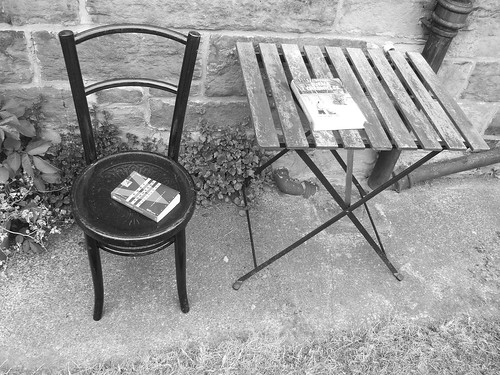Cash: I See a Darkness
Reinhard Kleist
Self Made Hero

"If you wanna save your soul from hell, cowboy, then change your ways today. Or you'll ride with us through these endless skies, forever on the hunt for the Devil's herd..." Ghost Riders in the Sky
To say award-winning German comics creator Reinhard Kleist's graphic biography of the late, great Johnny Cash arrived with a fair weight of expectation - mixed with anticipation - on my part is an understatement. Those of you who've been reading the blog for a good while may recall that we first talked about this work nearly two years ago when the original made a big splash in Germany. In fact it sold out its original print run from Carlsen and among the awards it picked up was the prestigious Max und Moritz, before going on to be picked up and translated into other languages by publishers like Dargaud in France and an English language version was apparently on the cards from Dark Horse. Since many of us were eager to read it in English we were pretty happy at this, but then it went quiet and seemed to vanish off the radar until Blighty's Self Made Hero stepped forward. Home of the Manga Shakespeare and some fine literary adaptations we've been very much enjoying this seemed like quite a departure for them. Was it worth the wait? Was it worth the effort? Oh yeah. It was.

(The Cash family, including young Johnny, singing in the cotton fields)
Anyone who's listened to Cash's music over the years knows his songs came out of his life; the darkness and the light were both there, he lived through them, he pretty much lived his songs. And that's part of the point Kleist makes here, how so many people (including people like me who'd normally run a mile from anything remotely labelled C&W) bought into Cash because his singing is honest; you feel the raw emotion in his voice, in the early work and even in the final years (his cover of Hurt is immensely raw and powerful, for example, it could have been made for him to sing at that age in his life).
But since Cash's songs often deal with loss and the struggles against the forces that can all too easily grind us all down in everyday life, living those songs means he himself never had an easy life and Kleist selects segments of Johnny's life, from the childhood days on their New Deal sponsored cotton farm, struggling to fight their way out of the Depression, singing to keep up their spirits during back-breaking labour, marrying too young, his self destructive, amphetamine and booze fuelled behaviour touring on the road as his success grew, the love between Johnny and June Carter, the famous music gig at Folsom Prison.

(Folsom Prison; no fancy sets or theatre, just Johnny, June and the boys in the band in front of hundreds of hardened prison inmates; a gig that's passed into musical legend)
Its a long work as comics go, over 200 pages, but even so there is no way it can pack in as much in depth detail as a prose biography and Kleist wisely avoids the temptation to simply jam in as much of Johnny's life as he can. Instead he opts for a roughly chronological approach which takes in elements of the life that shaped Cash and his music, interspersed with comics interpretations of of some of his songs. In fact the book itself opens with one of these songs being acted out - almost the equivalent of the dream sequence in a movie, where the protagonist drives a car with number plates reading 'HELL' through the streets of a gambling city where he "shot a man in Reno, just to watch him die." While some of the song sequences have a slightly different style about them Kleist keeps the differences in style mostly small so on a first reading it isn't always obvious you're in a song/dream segment and not an actual 'proper' biographical chapter, until the penny drops and you realise this is based on one of Cash's songs.
At first I thought this was a bit of a failing on the artist's part, not more clearly differentiating between biographical and song-based chapters. But as I was drawn further and further into the book I changed my mind and decided that this was actually a good decision on Kleist's part; as I said earlier you can't really separate the man and his music; he sang life as he saw it and lived it, they were part of him and he's in each of them, so although the song chapters are a sort of fantasy they are also, in their own fashion, biographical.
The art through most of the book, both the biographical and the interpretations of the songs, is mostly in a suitably moody black and white with some gray tones for effect, although occasionally for the songs Kleist uses a more cartoony style (such as he uses for 'A Boy Name Sue'). There are a couple of distinctive exceptions to this, however, a section where June and his mother try to help Johnny kick his dependence on drugs that's leading him down a dark highway, executed in negative: white lines on a black background, an eerie sight of a human nervous system arced in pain, a glowing ball emerging from within, darkness and light, black and white, drugs dependency and love all warring within his body in a couple of wordless but very powerful pages. A song segment for The Ballad of Ira Hayes is again in a totally different style, much more symbolic and cartoony but equally powerful and, given the contrast they make with the principally more regular style through the rest of the book their impact is much stronger.

"Call him drunken Ira Hayes
He won't answer anymore
Not the whiskey drinkin' Indian
Nor the Marine that went to war
There they battled up Iwo Jima's hill,
Two hundred and fifty men
But only twenty-seven lived to walk back down again
And when the fight was over
And when Old Glory raised
Among the men who held it high
Was the Indian, Ira Hayes" (the Ballad of Ira Hayes)
The music itself is normally presented in long, winding strips, reminiscent of the stretched out, long, narrow proto-speech bubble you see on say, 19th century cartoons, before the more common, modern speech bubble developed. Here Kleist uses speech bubbles for, well, speech, the long, thin ribbons for the songs. Its simple but very effective, giving the reader something of the feel of music, the way it doesn't always seem to come from one source but moves through the air, reflecting, echoing, drifting, carried on the wind, almost an elemental force. It also allows Kleist to visually display something of the power of music; for me he achieves this most powerfully in the chapter on Folsom Prison, as the music drifts out seemingly on the wind, across the echoing, depressing halls, through the bars, the razor wire and out into the trees beyond. Its hard not to think of the opera scene in The Shawshank Redemption and like that remarkable scene of modern film this too has a simple, elegant power to it about the ability of art to touch lives and reach through barriers.

(Cash and Dylan jamming in a studio; how much would you love to have been in that room??)
Its a wonderful read; in fact I found after I'd finish I had to go back and re-read it more slowly and enjoyed it even more on the second reading and I know its going to be one of those special books that I go back to every so often and read once more. Its a story of a 20th century icon, a man who bestrode pretty much all normal boundaries of genre to appeal to a far wider audience and a remarkable life. Its a story where the likes of Jerry Lee Lewis, Elvis Presley and Bob Dylan are just supporting characters (let me say that again: Lewis, Elvis, Dylan - I mean come on! Great flawed gods of music). But mostly its about a man, the darkness he sees around him that almost swallows him and the lights that lead him back out the edge of the darkness (although he'd never be completely free of it), the love of his mother, his lost brother, June. This will be going on my books of the year list.
Reinhard Kleist will be one of the guests at the excellent Comica festival in London this year; He will be in conversation with (appropriately enough) someone well known to Brit comics and music fans, Charles Shaar Murray on November 22nd; details here.











